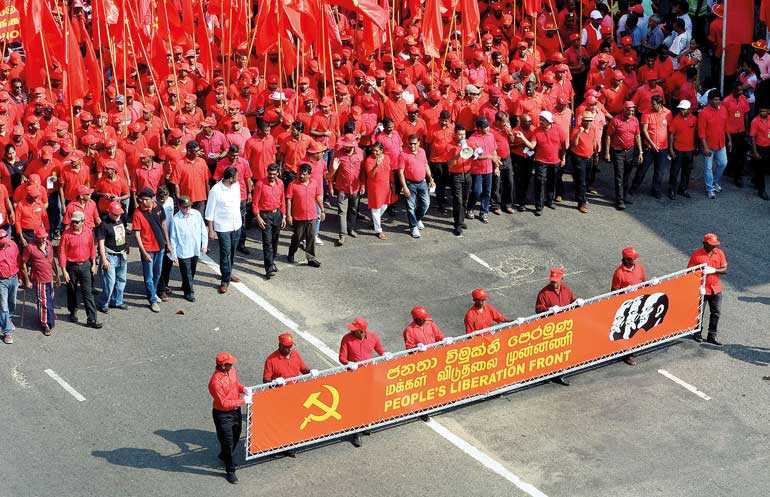Friday Feb 20, 2026
Friday Feb 20, 2026
Thursday, 21 February 2019 01:18 - - {{hitsCtrl.values.hits}}

However much and in whichever manner one shuffles the pack of cards in Sri Lankan politics, five jokers constantly appear right at the front: an incompetent Ranil Wickremasinghe (RW), a schizophrenic Maithripala Sirisena (MS) and sanctimonious Rajapaksas – Mahinda (MR), Gota (GR) and Basil (BR). These are the ones who are desperately on the run looking for some electoral configuration to win the forthcoming election race and capture the presidency and prime ministership.
It appears that the country has no credible alternatives other than the above five, and a feeling of despondency seems to paralyse the voting public. However, a serious review of the situation should consider JVP as a promising alternative. Even if it emerges with enough seats in the Parliament to hold the balance of power that would at least keep the other “bastards honest”.
 There is no need to repeat the achievements and failures of MR, MS and RW. They are now common knowledge. Instead, what is important to note are the fundamental and structural issues in relation to polity remain unresolved, which continue to frustrate and jeopardise attempts to tackle the more immediate problems such as rising cost of living, widening income disparity, corruption, lawlessness, drug culture and frequenting natural disasters.
There is no need to repeat the achievements and failures of MR, MS and RW. They are now common knowledge. Instead, what is important to note are the fundamental and structural issues in relation to polity remain unresolved, which continue to frustrate and jeopardise attempts to tackle the more immediate problems such as rising cost of living, widening income disparity, corruption, lawlessness, drug culture and frequenting natural disasters.
The year 2009 was a golden opportunity for MR to clean the slate and write a new chapter to build a united Sri Lanka based on principles of democracy, justice and equity. With a heroic fame he enjoyed after winning the civil war and eliminating separatist tendencies he could have become the father of a new nation had he taken the time to reflect upon and implement measures to heal the wounds of the war victims, reduce the size of the military, which was now becoming depressingly unaffordable, rationalise budgetary expenditures to increase savings and reduce a war-driven national debt, prioritise the developmental needs and seek foreign assistance at affordable terms, and above all provide an administration clean of corruption and nepotism.
MR squandered this opportunity, made his presidency absolutist, worsened the war-driven debt by limitless borrowing to finance prestige-driven projects and turned the country into a playground for regional power brokers.
The year 2015 provided his successors a second chance to put the house in order. Voters entrusted the MS-RW couple with a clear mandate to clean up the mess left by MR. Instead of cleaning up, the new regime through sheer incompetency and interpersonal acrimony dragged the country even deeper into the quagmire.
Politically divided and economically battered, the nation has now reached a dead end. Ethnic politics and neoliberal economics, the foundation on which Sri Lankan polity is structured since 1977 (although ethnic politics predates 1977) is cracking underneath threatening to bring down the entire superstructure. Sometime towards the end of this year voters will be asked to make another choice for new leadership. What choice do they have given the abysmal record of the ones on the run?
The JVP is an untried horse with able leaders and it has immense potential to take the country in a new direction. So far the performance of their representatives in Parliament has demonstrated an unassailable commitment to uphold the principles of democracy and law and order while restructuring the polity upon a different foundation. In that respect they have declared a readiness to reconsider the economic package of neoliberalism and weed out its costly outfits to make it more humane with greater role for the State.
From their parliamentary debates one is able to glean JVP’s resolve to abolish the executive presidency, reassess alliances with foreign powers in the interest of strengthening the nation’s sovereignty, undertake measures to eradicate corruption and provide clean administration, and above all to put a stop to ethnic politics, which has been the bane of this country since its independence.
In a startling revelation made recently by Ranjan Ramanayake from UNP, it appears that there are a number of parliamentarians outside JVP, who are addicted to drugs. Whether they are drug users or dealers or both one does not know. Even if they are recreational users only, do people really want to be governed by such drug using legislators?
One obvious question however, and often raised by many is, whether JVP can be trusted given its Marxist orientation and violent past. A short answer to the question is a counter question: Is this question valid now?
The two armed insurrections of 1971 and 1987-1989, products of JVP’s juvenile romance with Marxism is a tragic chapter in the party’s political evolution. The fact that these uprisings sacrificed the lives of thousands of young Sinhalese men and women is a sordid episode and its critics are demanding a public apology from its current leadership.
However, one should not forget that the vast majority of the current generation of JVP cadre were not even born in 1971 and at best they were budding teenagers in 1987. There is no need to elaborate here on the peculiarities of teenage.
It was an arch Hindu conservative and the last Governor General of India before it became republic, Chakravarti Rajagopalachchari or Rajaji as he was popularly known, reported to have once said that, if a person didn’t become a socialist in his/her twenties and thirties that person had no heart but if that person continued to remain socialist in forties and after he/she had no brain. This may be factually inaccurate and a gross generalisation, but it underlines the fact that age mellows one’s emotions and matures one’s thought.
It is in this light people should view the present generation of JVP men and women who are committed to the glory and independence of their motherland and prosperity of its people. Political pragmatism with firm commitment to uphold national sovereignty and economic independence has overtaken JVP’s previous textbook Marxism. Even regarding its attachment to Marxist ideas the party could not be criticised, because Marx’s critique of capitalism and of its atrocious free market ideology remains valid still.
The worsening income disparity on global scale, which has obscenely enriched just 1% of total humanity at the expense of the rest ninety-nine, is one among a number of disgraceful and disgusting indices of the cruelty of globalised economic liberalism. This is why JVP’s readiness to review the liberal economic agenda of current and previous regimes should be welcomed. This is not blatant radicalism but pragmatic rationalism based on egalitarianism and justice.
Finally, the minority communities should realise that they will have no peace and end to their sufferings as long as ethnic politics rules the day. The strategy of countering majoritarian ethno-nationalism with minoritarian ethno-nationalism is suicidal. One needs to break this vicious circle. The three major contenders – UNP, SLFP and SLPP – are all beneficiaries and tolerators if not open promoters of ethno-nationalism, and JVP is the only one that is prepared to eschew ethnic politics.
In the fifties and sixties when progressive forces from the majority community appealed to the minorities to join hands in building a nation founded on principles of egalitarianism and economic independence those forces were rejected by both minorities in favour of their own ethno-nationalist politics. In a sense, the civil war was a product of this rejection. JVP is offering another chance to get rid of the ethnic menace. Will the minorities reject again?
The JVP deserves a chance and country deserves a change.
(The writer is attached to the School of Business and Governance, Murdoch University, Western Australia.)